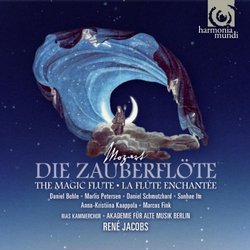| All Artists: Daniel Behle, Marlis Petersen, Daniel Schmutzhard, Sunhae Im, Anna-Kristiina Kaappola, Marcos Fink Title: Mozart: Die Zauberflote (The Magic Flute) Members Wishing: 1 Total Copies: 0 Label: Harmonia Mundi Original Release Date: 1/1/2010 Re-Release Date: 9/14/2010 Album Type: Box set, Import Genre: Classical Style: Opera & Classical Vocal Number of Discs: 3 SwapaCD Credits: 3 UPCs: 794881966721, 794881966721 |
Search - Daniel Behle, Marlis Petersen, Daniel Schmutzhard :: Mozart: Die Zauberflote (The Magic Flute)
 | Daniel Behle, Marlis Petersen, Daniel Schmutzhard Mozart: Die Zauberflote (The Magic Flute) Genre: Classical |
Larger Image |
CD DetailsSimilar CDs |
CD ReviewsA Magic Flute that's at last... Magical R. Gerard | Pennsylvania USA | 09/14/2010 (5 out of 5 stars) "Die Zauberflote/The Magic Flute, the third and most enduring of Mozart's singspiels (after The Impresario and The Abduction from the Seraglio [and Zaide, if you're a completist]), is one of those operas that has been recorded almost to death. So who needs another recording of it? This is the latest of Rene Jacobs's endeavors, and what seems like his magnum opus in regards to his Mozartian output. His DaPonte trilogy and two opera seria(though Tito is not one of my desert-island works) have each received generally positive reviews. In each, Jacobs was unafraid delve as deep as he could into historically-informed practice, giving the listener a revelatory, and sometimes shocking and controversial, perspective on these old favorites. Die Zauberfloete is the standout. It is the only singspiel he has yet recorded, and the presence of unaccompanied dialogue presents new issues/challenges for the conductor. (To date, Jacobs has recorded all of Mozart's complete mature operas except for The Impresario and The Abduction). It is commendable that Jacobs has chosen to retain almost ALL of Schickaneder's dialogue. Nearly all recordings omit large sections, subtracting both comedy and depth to this fairytale/Masonic allegory of a theatre piece. In most recordings and performances we miss chunks of dialogue that make the plot more coherent: We usually don't hear the dialogue of slaves in Act I, where we first learn of Monostatos's character and his relationship with the other slaves, and of Pamina's first attempt to escape Sarastro's palace; we usually don't hear the whole story about the Queen of the Night's motivation for murdering Sarastro in the middle of Act II before her famous aria. Jacobs reinstates all of this, (including those sections that have been omitted - understandably - due to potentially racist or sexist interpretations today, though I admit it does give much insight into the societal norms of Mozart and Schickaneder's world). Jacobs stays true to theatre, moreso than ever, adding sound effects where the original libretto calls for them -thunder, raging water, roaring beasts- , urging the cast to act using only the voice (which he has done with remarkable results in the recitatives of Mozart's Italian operas). This adds to the length, yes, but it does not subtract from the listening experience. Rather, it enhances it. Harmonia Mundi's sound quality adds to the realism of the listening experience. For once, here's a recording of Die Zauberfloete where I don't find myself skipping over the dialogue. It is even more commendable the Jacobs exhausts as many pertinent, contemporary accounts of Mozart's preferred tempi. Your ears may need adjusting to the brisker-than-normal "Ach, ich fuehl's," for example, though the tempi were chosen by Jacobs because of what firsthand accounts noted of performances under Mozart's baton. For instance, Jacobs uses the testimony of a particular musician who played in the first performances under Mozart's direction. Writing in the early 19th century, decades after Mozart's death, the musican posited that Pamina's famous aria was unfortunately performed twice too slow for what Mozart intended about twenty years earlier. Sarastro's lines are taken a little more quickly, peeling off the layers and layers of Romantic affectations, exposing a brilliant, shining musical product of The Enlightenment. Jacobs goes into more detail in accompanying materials. As for the singers, there is not one missing link. Jacobs has a knack for utilizing relative unknowns. Sunhae Im, who I first encountered on Jacob's recording of "Tito" is a charming Papagena. Typically cast in smaller, lighter, spinto roles like Servilia and Zerlina, the role suits her well. I would be hard-pressed to find a better Pamina than Marlis Petersen. Barbara Hendricks held that role in my book for years, though Petersen sings both youthfulness and power that the character requires. Pamina is a young girl, but the music written for her requires such a wide range of expressiveness (I keep in mind that Mozart indeed wrote the role to be sung by a seventeen year old soprano, Anna Gottlieb.) Petersen delivers this, along with such an astounding vocal control and astute use of vibrato that make other recordings sound too affected and Romanticized. The make-or-break character for many listeners, of course, is the Queen of the Night, a short but devilishly difficult role for any soprano to take on. Here, it is taken by yet another performer who I had not previously heard of, Anna-Kristiina Kaappola. This is one of those instances where I wonder why certain artists are not as well recognized as others. I adore performances of the Queen by Petibon, Damrau, Dessay, et al, but Kaappola's performance is otherworldly. Her high notes are birdlike, strong and effortless, without any hint of strain (unlike Petibon's). She is also regal, which is the X-Factor that many Queens lack. My favorite is still Edda Moser (on the old Sawallisch record... If it's good enough for aliens in space, it's good enough for me!) I would be amazed to hear anyone rival Moser's smouldering middle-register, perfect for the second aria, but Kaappola is definitely my second choice. Her rendition is different from Moser's- less vehement, more subtle, and perhaps more sinister and believably three-dimensional because of it. Listen to her dialogue with Pamina in Act 2. I could only hope this amazing performer becomes more widely-recorded. I had hoped Tamino would have been filled by Kenneth Tarver, the same who sang Ottavio in Jacob's recording of Don Giovanni and Arbace in Idomeneo, or by Topi Lehtipuu, my current favorite tenor who sang Tamino under Jacobs's baton in live performances. I had not heard of Daniel Behle, but was not disappointed by his casting choice on this record. He is strong and princely, just as he ought to be. Regarding the minor characters, each is impressively sung, particularly the three boys chosen from the Sankt Florianer choir. As with any Mozartian endeavor by Rene Jacobs, I always expect him to deliver, and I am rarely disappointed (the exception, again, is Tito). Buy this recording. No matter how many Magic Flutes you've heard or own, this is one where you could see Mozart in your mind's eye, and the spectacle of Schickaneder's theatre." A Fantastic, Enlightened, "MAGIC" Flute from Jacobs!!! Gregory E. Foster | Portland, ME, USA | 09/22/2010 (5 out of 5 stars) "Die Zauberflote (the Magic Flute) is, of course, part folk tale, and part philosophical speech(es) thus "singspiel". But for most of us it is, of course "PURE MAGIC". This recording certainly IS that! For those already familiar with Rene Jacobs and his work with the operas of Mozart, you already know what to expect here, I bet. But be prepared for a surprise when you hear this absolutely stunning recording of Mozart's well-loved final singspiel. Mr. Jacobs has exhaustively researched this most special of the great master's works and has applied all he learned to this magnificent new recording. Every single word of Schickaneder's spoken dialogue has been re-entered here and the results are phenomenal. We are given a Zauberflote that sparkles and "lives" as no other recording before it has. (Yes, there are a great many absolutely lovely, and "necessary" recordings that belong in one's collection), but this one now leads the pack and, rightly, so it should. A great many always complain about the spoken parts, and also the length this adds...don't pre-judge this one until you have actually sat down and listened to it! You're in for a real treat, I believe. Jacobs has adjusted tempi, etc., wherever he found documented, conclusive, evidence that has been wrongly presented (interpreted) even a short time after Mozart's death. And so, this great conductor and interpretive genius now gives us this superb, absolutely scintillating, "new" `die Zauberflote' for our enjoyment. The orchestration, while period, as many others have been before it, has been further re-adjusted to be as close as could be determined to exactly what Mozart would have heard at the premier, and during his lifetime, for this most lovely of his stage works, right down to a historic wooden flute. (Be sure to listen to the sound bites above from this recording.) The singers? Well, I would be very hard-put to lay negative comments on any of the cast. Many were totally unknown to me, and that is another great "surprise" with this recording...fresh new singers and interpretations of these endearing and lovable characters...yes, even Monostatos (you've got to love him, too). Marlis Petersen gives us a wonderful, fresh-voiced Pamina, expertly delivered and with great feeling. I am always amazed at Jacob's ability to "find" these singers that he always seems to come up with. It seems this man must somehow be a magnet of some kind that attracts fresh new talent! The Konigin of Anne-Kristiina Kaappola is very good indeed. Strongly delivered, but never strident as she sometimes becomes with some singers, her interpretation here is well presented. Daniel Behle sings Tamino with the fresh innocence of youth, vibrant and lively, beautifully sung throughout, expressive and nicely turned in this role. I shall look forward to further recordings that he partakes in. Sarastro, sung by Marcos Fink, is wonderful. Noble and grand, wonderfully expressive and patriarchal, as he should be, leading and urging our young lovers through their trials. Sunhae Im and Daniel Schmutzhard are wonderful as our bird-catcher and his mate. Both of them turn in wonderful characterizations of Papagena and Papageno, never disappointing, and both done with aplomb and fabulous interplay. This cast certainly is the equal of any other recording overall, shoring up once again Jacob's ability to assemble a cast up to his standards which, indeed, always seem "right" in his interpretive efforts to bring to us "perfection" in his Mozart opera recordings, and indeed, all his recordings. As I mentioned above, tempi changes have added new light and dimension to these characters, and this further pushes this most special recording up the scale to what I now (at the moment, with only a couple of 'listens' to it) feel is "first place" as an overall recommendation for this work. Don't get me wrong, there are plenty of other recordings deserving space on one's shelves. The Klemperer on EMI (the first recording I ever owned of this work) will always hold a very special place in my heart. Also, the first Solti recording on Decca (for some reason I find his later "go" not up to the level of praise that most lavish on it), the Maazel on DG is another very fine recording, the Colin Davis on Philips stands out, the 1950 Karajan (for the singers), Karl Bohm's recordings all contain wonderful things, and, for me, the "best" previous recording is the lovely William Christie effort on Erato. I would not trade, nor give up, any of these recordings, but Rene Jacobs, now takes first place with this simply lovely new recording from Harmonia Mundi. Also, I must mention, the booklet included here is just magnificent, all orchestra members get credit, short bios of the singers, etc., and informative info regarding historical aspects of the work, and lovely color illustrations and photos on a great many pages...this recording is a first-class production every step of the way, and Harmonia Mundi and Rene Jacobs certainly deserve high praise for their efforts put forth here...very well done! Go Ahead! Indulge Yourself!.....Your ears are in for a real treat.....Your heart will fall in love all-anew with this most special "Magic Flute". I'm betting that when Gramophone, BBC, and others give out their awards for Opera this year, this will be the one they select... Brava! Rene Jacobs, for all you have done, and all you do, for us who revere great music and opera, especially Mozart's! ~operabruin " Jacobs puts on quite a show and delivers lots of novelty, bu Santa Fe Listener | Santa Fe, NM USA | 09/28/2010 (4 out of 5 stars) "Rene Jacobs stands in the forefront of HIP conductors, but the reason has little t do with the previous starry-eyed reviews. We are past the novelty of authenticity when it comes to sped-up tempos, quirky accents, zingy strings, and academic details. The time arrived when musicianship had to present itself as the deciding factor. Jacobs is an imaginative musician, so even those of us who are non-fans of period performance can appreciate his many personal touches, which to tell the truth are not all authentic--many are solely his inventions: in the first entry of the Three Ladies, for example, as they argue over the comely Prince lying at their feet, Jacobs inserts an accelerando as the argument heats up, followed by a slow-down and pause on the last "Ich." Since I am all for originality and quite against the lock-step dryness of most HIP recordings, my reaction was very positive.
Besides his musical inventiveness, Jacobs has always put the drama foremost in his Mozart recordings, going so far as to allow much more freedom for his singers than anyone in the traditional scheme. You have to go back decades, to Fricsay and Bohm in their Zauberflotes on DG, to find half as much "business" between the stage characters, and since Jacobs adds almost constant sound effects, along with much more than the usual portion of dialog, his singers must really push on the acting side. Thus we get an excitable, pleasingly bird-brained Papageno who twitters on his pan pipes at odd intervals and shakes his bird cage, giving rise to a good deal of twittering from there. The most drastic departure from the score is the commentary from a fortepiano during the dialog, mostly reprising the best tunes with a riffle of common chords. Adding music to Mozart may be fun, but if he wanted accompaniment during the dialog, wouldn't he have written it? And if the interludes were improvised, do we have the right to stitch together our own? The overall effect is to restore Die Zauberflote as a popular show, full of sausage-and-beer earthiness, zany shtick, and caricature as the chief style of comedy. Jacobs has taken a strong stand, and the listener will either adjust or not. There's so much funny business that it's hard not to go along. But Jacobs is attentive to the romantic story and the Masonic solemnity, too. He backs away from over solemnity and lightens the textures throughout, so the amalgam is captivating. With so much ingenuity on display, one could even overlook a singing cast that is less than world class. There is no doubt that this cast isn't made up of major singers. John Eliot Gardiner produced a HIP Zauberflote that is the strongest installment in his Mozart survey from two decades ago, and point for point Jacobs' choices are weaker. It's arresting to turn the Three Ladies into semi-zanies (who isn't tired of them being cast as stoic vestal virgins?), but Mozart posed difficult challenges for the lead singers, which is why the greatness of Schwarzkopf, Janowitz, Wunderlich, Popp, Berry, and Fischer-Dieskau has entranced us for forty years. Dismissing them as "too romantic" in favor of second-rate HIP substitutes doesn't wash, not with me, at least. There's really no point in detailing how the lead singers fare, since none are major artists or great new discoveries. If you are used to a good enough, plain-voiced Tamino, an adequate but hardly charismatic Queen of the Night, a clownish Papageno with a middling voice, an affecting Pamina who could be interchanged with half a dozen others, and a mellifluous Sarastro on the baritonal side who lacks the low notes in his two arias, you know what to expect here. This is a good ensemble cast by any measure, not a cast of opera stars. Of course, that is not a damning comment. I just wanted to counterbalance the hyperbole of the five-star reviewers. In the final analysis, this is Jacobs' show, to an extent that wasn't true of his wonderfully sung Don Giovanni. He has given Die Zauberflote a transfusion of pop energy to rescue it from a cast of tired blood. The result is fresh and effervescent, but I'm not so sure the patient was sick to begin with. A huge dollop of Gemutlichkeit makes the medicine go down easily, but still . . . Here is Jacobs' cast: Daniel Behle (Tamino), Marlis Petersen (Pamina), Daniel Schmutzhard (Papageno), Sunhae Im (Papagena), Anna-Kristiina Kaappola (Königin der Nacht), Marcos Fink (Sarastro), Kurt Azesberger (Monostatos), Inga Kalna (1st Lady), Anna Grevelius (2nd Lady), Isabelle Druet (3rd Lady), Konstantin Wolff (Speaker), Joachim Buhrmann, Konstantin Wolff (2 Priests), Magnus Staveland, Konstantin Wolff (2 Armed Men), Alois Mühlbacher, Christoph Schlögl, Philipp Pötzlberger (3 Boys) & René Möller, Clemens-Maria Nuszbaumer, Christian Koch (3 Slaves) RIAS Kammerchor & Akademie für Alte Musik Berlin, René Jacobs" |



